
February 2018
Field journal: Practicing geology in Big Sky Country
Beluga whales dive deeper, longer to find food in Arctic
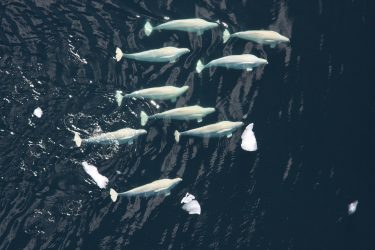
The reduction of Arctic sea ice has a clear impact on animals that rely on frozen surfaces for feeding, mating and migrating. But sea ice loss is changing Arctic habitat and affecting other species in more indirect ways, new research finds.
Beluga whales that spend summers feeding in the Arctic must dive deeper and longer to find food than in previous years, according to a new analysis led by University of Washington researchers. The study, published this month in the journal Diversity and Distributions, is one of the first to consider the indirect effects of sea ice loss on Arctic species that dwell near the ice but don’t necessarily depend on it for survival.
“I think this paper is novel in that we’re presenting some of the first indirect effects of sea ice loss for an Arctic whale species,” said lead author Donna Hauser, a postdoctoral researcher at the UW’s Polar Science Center and former doctoral student at the School of Aquatic and Fishery Sciences. “As changes in sea ice affect oceanographic properties, that could be affecting the distribution, abundance or species composition of prey for belugas.”
Read more at UW Today »UW, other leading research universities form international coalition to speed local climate action
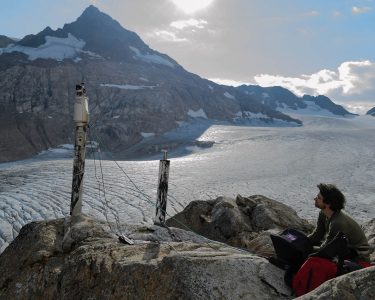
The University of Washington joins 12 other leading North American research universities in the new University Climate Change Coalition, or UC3, a group committed to leveraging its research and resources to help communities accelerate climate action. The coalition, which launched Feb. 6, includes universities that have committed to mobilize their resources and expertise to accelerate local and regional climate action in partnership with businesses, cities and states.
Among other facets of UW’s contributions, Climate Impacts Group and EarthLab — both part of the College of the Environment — are tackling climate resiliency and our most pressing climate challenges through continued research, analysis and community partnerships. Hundreds of UW students, faculty and staff conduct research and projects on all seven continents and all five oceans, focusing on critical issues such as ocean acidification, freshwater resources, natural hazards and the disappearance of ice in polar regions.
“UW scientists are leaders in groundbreaking, collaborative research to advance climate science, understand impacts and build pathways to solutions. We’re excited by the new partnerships and opportunities that the University Climate Change Coalition offers. Working together will strengthen our ability to sustain the health and well-being of our communities and our planet,” said UW College of the Environment Dean and Mary Laird Wood Professor Lisa Graumlich.
Read more at UW Today »UW atmospheric scientists flying through clouds above Antarctica’s Southern Ocean
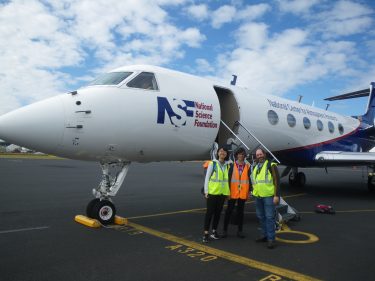
University of Washington scientists are part of an international team that is spending six weeks in the remote Southern Ocean to tackle one of the region’s many mysteries: its clouds.
What they discover will be used to improve climate models, which routinely underestimate how much solar energy bounces off clouds in that region. Simulating how much solar energy is absorbed or reflected on Earth is key to calculating the future of the planet under climate change.
“Much of what we currently know about Southern Ocean cloud, aerosol and precipitation properties comes from satellite-based estimates, which are uncertain, and have undergone few comparisons against independent data,” said team member Roger Marchand, a UW research associate professor of atmospheric sciences. “The data collected during SOCRATES will also enable us to evaluate current satellite data over the Southern Ocean, as well as potentially help in the design of better satellite-based techniques.”
Read more at UW Today »
Research uncovers the mysterious lives of narwhals
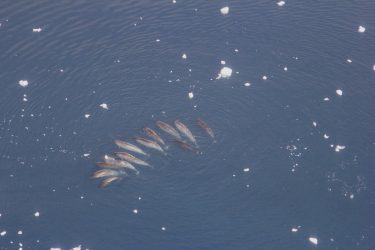
Narwhals are some of the most elusive creatures in the ocean, spending most of their lives in deep water far from shore. But research being presented at the Ocean Sciences Meeting in Portland Feb. 12 may shed a bit of light on these enigmatic marine mammals.
New research shows narwhals may prefer to congregate near unique glacier fjords with thick ice fronts and low to moderate calving activity, where icebergs break off infrequently. It appears narwhals prefer the freshwater coming off still, serene glaciers over the silt-filled runoff discharged from very active glaciers.
“Arctic marine mammals are really good indicators of climate change because they are very specialized,” said Kristin Laidre, a marine biologist at the University of Washington’s Polar Science Center and the School of Aquatic and Fishery Sciences. “They are finely attuned to specific environmental conditions, so they are good indicator species for how the physical changes many scientists are documenting in the Arctic can reverberate throughout the ecosystem.”
Read more at UW Today »Ice core shows North American ice sheet’s retreat affected Antarctic weather

Researchers at the University of Washington were among the co-authors of a new study that uses ice core data to see how Earth’s climate behaved at the end of the last ice age, when the Laurentide Ice Sheet covering much of North America retreated about 16,000 years ago.
The study led by the University of Colorado Boulder is published online this week and will be in the Feb. 15 print issue of the journal Nature.
“Our data are from just one location in Antarctica, but the results provide an indication of how climate variability changed across most of the Southern Hemisphere — and perhaps most of the globe — as the Northern Hemisphere ice sheets receded at the end of the ice age,” said co-author Eric Steig, a UW professor of Earth and space sciences.
Read more at UW Today »UW’s large research vessel, R/V Thomas G. Thompson, gets back to work
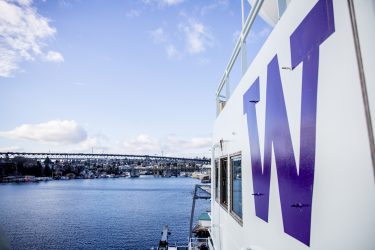
After an “extreme makeover” that went from stem to stern on five decks of the ship, the R/V Thomas G. Thompson is ready to get back to work exploring the world’s oceans.
The University of Washington’s School of Oceanography, part of the College of the Environment, operates the 274-foot ship, which arrived on campus in 1991. In summer 2016, with funding from the U.S. Office of Naval Research, the National Science Foundation and the UW, the vessel headed to a Seattle shipyard for an 18-month midlife refit that will extend its life for another quarter century.
“The Tommy Thompson has a rich history of science and exploration, and now she’s better equipped than ever to travel the world’s oceans and help students and scientists make new discoveries,” said Virginia (Ginger) Armbrust, professor and chair of the UW School of Oceanography.
See also:
- Geekwire: “University of Washington’s top research ship returns to duty after midlife makeover“
- King 5: “UW Research Ship ‘Smarter Than The Human Brain’“
- The Seattle Times: “Spanking new look for UW ocean-research ship R/V Thomas G. Thompson“

March 1, 2018
Climate Change, Seafood Production and the Future of Fisheries

March 5, 2018
Meet, Greet, Teach: Expanding the Science Team
 Check out our calendar for more events
Check out our calendar for more events
- Three UW Innovation Awards given to UW Environment faculty, UW Environment
- Aquatic and Fishery Sciences' Chelsea Wood awarded Sloan Fellowship, UW Environment
- Undergraduate blog highlights scientific stories at the heart of the Bevan Series on sustainable fisheries, Aquatic and Fishery Sciences
- Q&A with graduate student Alex Gustafson, Marine and Environmental Affairs
- Q&A with alumna Sarah Nayani, Marine and Environmental Affairs
- Ocean optimism: Lighting the way for conservation, Marine and Environmental Affairs
- UW's Shelby Logsdon sets out to collect and analyze state park data, Program on the Environment
- New CIG report: Nooksack Indian Tribe natural resources climate change vulnerability assessment, Climate Impacts Group
- YouTube
- Newsletter
- Podcast






